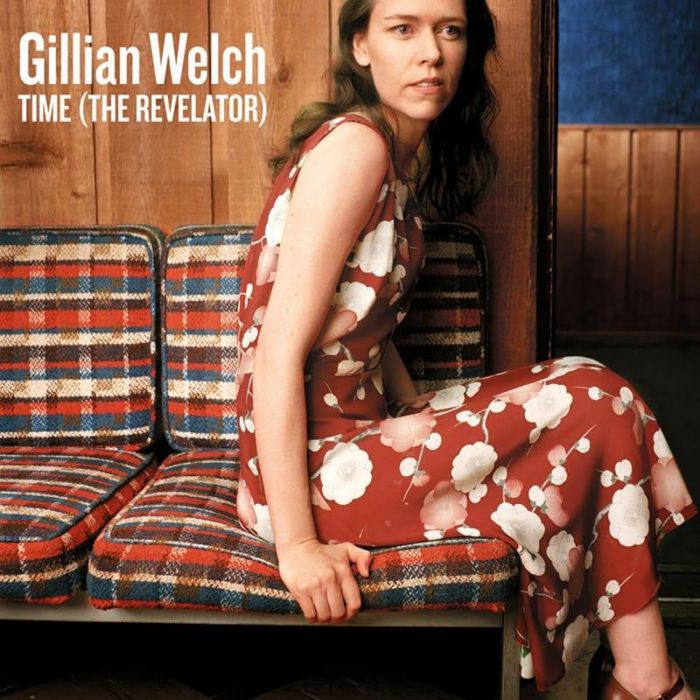Time (The Revelator) by Gillian Welch (Review)

On her third release, Time (The Revelator), Gillian Welch continues to exhibit her brilliant ability for combining traditional, old-fashioned themes and music with a unique modern perspective. Welch’s strong, sure voice reminds me of an old dusty farm, the toil of poor laborers, and the sorrow of an empty still. Her music, infused with guitars, banjos and mandolins, echoes the Depression era and backwoods bluegrass, as well as folk music. Despite these retro influences, Welch isn’t content to merely refashion old songs. She puts her blood in her music and thus it remains distinctly hers.
Gillian Welch grew up in California, the daughter of parents who composed music for The Carol Burnett Show. Infused with a love of music, she chose to study at the Boston School of Music. While attending, she began to frequent a bluegrass jam session of fellow students. It was there that she met her current music partner, David Rawlings. They began to write lyrics and music together, as well as develop their vocal harmonies. Welch and Rawlings’ voices blend together so well that you are almost unaware that Rawlings is even singing along. This perfect mastery of harmony fills out the sound of Welch’s simple, pure voice without the nasty production effects that would mar an acoustic album such as this.
Time (The Revelator) begins with the title song, a soft prophetic warning about the power of time to reveal all of the “queens, thieves, and imitators.” Welch’s tired and weary voice captures the spirit of someone who finds “everyday is getting straighter” as time reveals the sadness they have brought upon themselves. The song ends with a beautiful guitar solo quietly unfolding to a stop.
Like many of the songs on this album, guitar solos are featured prominently as bridges and endings. This makes the music seem slowed down, almost lazy and meandering, but somehow sharper than that. I always end up following the guitar and feeling mellow as well as sweet, salty sad. The kind of sadness that is not purely sorrow but contains within it the memory of happiness.
After the title track, Welch and Rawlings lighten the mood, lest you turn the album off right away for fear of too many sad songs. They give us a nice banjo-fueled stomp song about a girl’s first lover. The lover tries to tell the girl that he has ruined her, but she refuses, explaining that she was not “waiting for a white wedding gown” and suffered no more than a “shaky morning after calling it quits.” This is just one clear example of the mixture of old styles with new perspectives. It gives me a voice that I don’t hear when I put on my Smithsonian Folkways bluegrass records (which also have their amazing qualities but have the disadvantage of being made before women were seen as equal partners in the music making business).
Welch and Rawlings create small stories within each song that clearly describe and introduce me to new characters. No matter the subject, these characters all end up being people you can relate to. In “Red Clay Halo,” they tell of a young poor boy who is rejected by the rich girls at a dance because his clothes are stained with the red clay of the fields he has to work. In “Elvis Presley Blues,” they retell the story of Elvis, capturing him as that young man who went on television in a “shirt his mother made” and “shook it like a chorus girl, shook it like a Harlem queen.”
The album ends with the 14-minute “I Dream A Highway,” a beautiful, wandering tune that captures the essence of regret, lost love, and self-doubt. Each time I hear it, especially while actually driving on the highway, I am overcome with the depth of emotion in each and every line (“I dream a highway back to you love/A winding ribbon with a band of gold”). The longing and sad desire in Welch’s voice is amazingly compelling and seems to come from a time beyond the present. Perhaps, this is the real nature of making music: the addition of a new voice to the continuing conversation, the adoption of the old and infusion of the new.
I strongly recommend this album to anyone who would like to ease into bluegrass or folk music. The musicianship is excellent, the writing is powerful, and the vocals will spark in you a wistful, sweet sadness. A sadness that seems to come, not only from your life, but also from the lives of all those who have come before you and worked the land, the factories, and lived poor lives in this country.
Written by Ruth Williams.